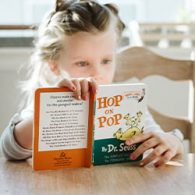A Schedule or a Go with the Flow Approach
“Martha, what is better for the kids’ learning environment, a schedule, or a more go with the flow approach?
Routine Makes the Brain Happy
To schedule…or not to schedule. That is a good question!
We like “routine” rather than “schedule”. What works well in a school or work situation may not translate well when you bring it home. Whether you call it a schedule or a routine, it’s important – at least in my personal experience – for my mental health and for its contribution to family harmony. In fact, a smart point Dr. Bill emphasizes in his newest book, The Healthy Brain Book, is that the brain likes routine – at all ages. Even better, a day spent following a routine, interspersed with a few “surprises” or anticipated novelties are what young brains love.
Benefits of Mandated Homeschooling
One teaching we highlight in most of our books is that parenting means giving your children the tools to succeed in life. The recently mandated homeschooling may turn out to be more of a blessing than a problem, for these reasons:
1. Better Learning Retention
Many classrooms are not conducive to learning and memory retention. Lighting is artificial, classrooms can be crowded, students must sit too long – indoors. In your home “classroom” you give your precious learners a subject to study on their own (older ones) or you teach a subject (younger ones). Then, before moving on to another subject, you announce: Let’s go outside for a while and think about what you just read/heard/studied, and we can talk some more while we take a walk. This exercise can literally turn into a science experiment entitled Your Growing Brain on Nature: sunlight, fresh air, and movement are the recipe for better learning. As Dr. Bill says in The Healthy Brain Book, scientists advise, “Take a think-walk in nature”.
2. Better Long-Term Memories
Ponder what you want your children to remember decades later when history reflects on this Corona Crisis. Sort of a long Family Staycation, when our family bonded because we had to opportunity. Hopefully, they will remember how their parents and caregivers, as “home teachers”, instilled into them Smart Tools for Life:
- Turn problems into opportunities for personal growth.
- You can’t always control situations – dangerous virus outbreaks – but you can control how you react to them.
- My parents seldom let the media bad news infect them. When confronted with it, they responded by saying, “We can handle this”.
3. Better Sleep, Better Learning
Homeschooling can mean you wave bye-bye to wakeup alarm clocks and starting school when young brains are not yet fully awake. (Remember some of the “bad old days” when this might have been the case in your home? I sure do!) Later awakening (since you don’t have to join a carpool), family breakfast (remember that?), morning walks (if you don’t have a dog, you can pretend) …then “school” starts. Young (and not so young) brains love easing into the day’s routine, with hope for accomplishment, boxes that can be checked off, predictability especially for the younger learners, room for surprises, and opportunities for personal growth, especially for the older kids and teens. When brains are rested, fresh, and uncluttered, learning is a source of joy for all.
4. Build Routine Based on Personality
Our family’s own experience has been that success with homeschooling comes when you structure your routine based on your personality and the personality and learning styles of your kids. A helpful place to start can be an hour of “academic time” in the morning – after some outdoor/indoor exercise – and again in the afternoon after time for chores and quiet reading or napping. Don’t forget time, maybe before lunch, for creativity – crafts, dance, cooking, building, sketching, any project that activates the creative, self-expressive part of young brains. And remember, staying peacefully connected with your kids is way more important than staying on schedule. It’s never too late to spend some time brainstorming with your family. Use this time to come up with improvements for the days ahead. Don’t hesitate to start over with a game plan if you haven’t found your groove yet.
Written by: Martha Sears, R.N.
Martha is the mother of Dr. Bill’s eight children, a registered nurse, a former childbirth educator, a La Leche League leader, and a lactation consultant. Martha is the co-author of 25 parenting books and is a popular lecturer and media guest drawing on her 18 years of breastfeeding experience with her eight children (including Stephen with Down Syndrome and Lauren, her adopted daughter). Martha speaks frequently at national parenting conferences and is noted for her advice on how to handle the most common problems facing today’s mothers with their changing lifestyles. Martha is able to connect with both full-time, stay-at-home mothers and working mothers because she herself has experienced both styles of parenting. Martha takes great pride in referring to herself as a “professional mother” and one of her favorite quips when someone voices their concern about her having eight children in an already populated world is: “The world needs my children.”

